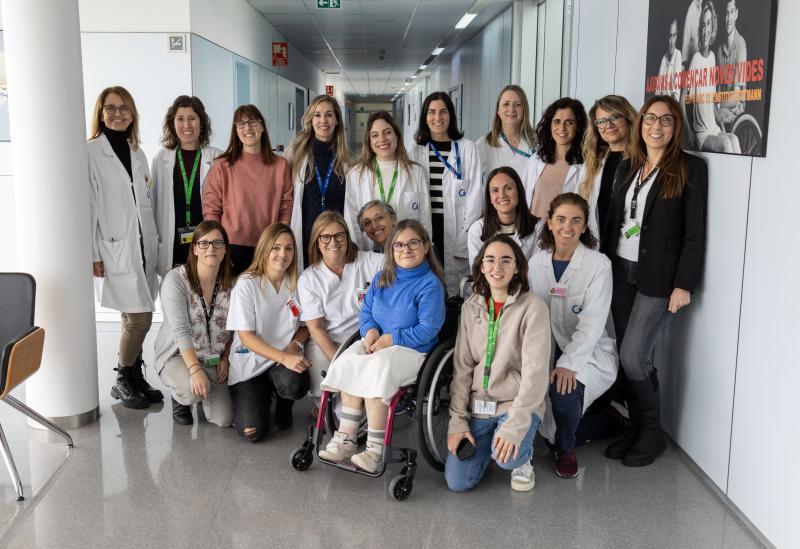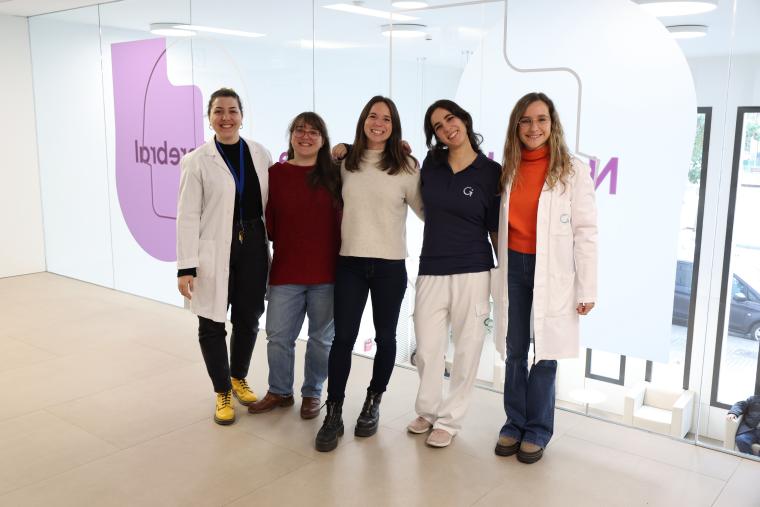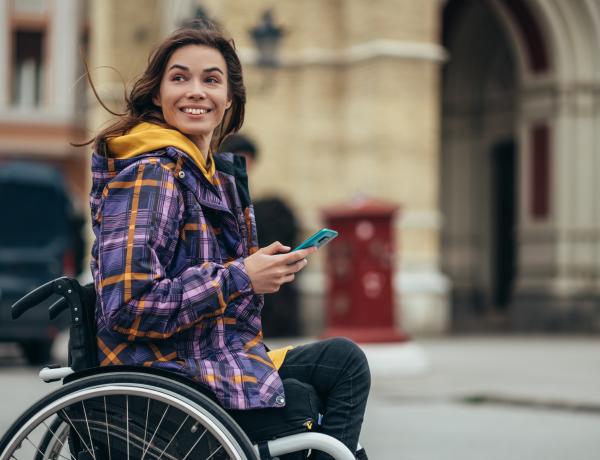Celebrating the International Day of Women and Girls in Science
Celebrating the International Day of Women and Girls in Science

With the aim of recognising the key role of women in science, the United Nations Assembly established in 2015 that every 11 February should be commemorated as the International Day of Women and Girls in Science. Since then, the celebratory nature of the event has not detracted from the vindication of a day that aims to encourage women's access to scientific careers and promote vocations in girls, in part by raising the profile of leading women.
The establishment of the day was preceded by painfully true evidence: “Although women have made great progress in increasing their participation in higher education, they are still under-represented in STEM (Science, Technology, Engineering and Mathematics) careers,” says the UN General Assembly. According to the report Scientists in Figures 2023, published by the Spanish Ministry of Science, Innovation and Universities, women currently account for 71.8% of those enrolled in undergraduate and graduate studies in Health Sciences, but only 26.5% of those enrolled in engineering and architecture. “There were not many women doing engineering at the UPC,” admits Alba Prats, a biomedical engineer and pre-doctoral student at the Guttmann Institute.
The figures get worse when analysing the development of research careers. Women account for 43% of research staff at universities and public research organisations, and as one moves up the ranks, a “scissors effect” appears: there is a similar proportion of men and women in grades D and C –predoctoral researchers and newly qualified PhDs_ but this begins to diverge at grade B (44.3% women and 55.7% men) and rises at grade A, that of university professor: 25.7% women and 74.3% men.
Contributing to research in many areas
Research at the Institut Guttmann would not be possible without the work of many women who, from a wide range of fields, contribute to advancing knowledge about neurological disorders. That is why we have asked them to tell us who they are and their impressions of their research work. “Research helps us to offer the best approach to our patients, but we often forget that valuable data can be obtained during clinical practice. Treatment and research are compatible and it is also very satisfying,” says Selma Delgado Gallén, doctor of Medicine and physiotherapist at Guttmann Barcelona. Elena Hernández, Head of Nursing at the Institut Guttmann, adds that “the combination of clinical experience and research skills allows us to develop more effective interventions, improve the quality of care and, ultimately, raise the standards of care for the benefit of patients”.
Many challenges lie ahead. Narda Murillo, head of Functional Rehabilitation at the Institut Guttmann, warns of the need for gender bias to disappear not only in research careers, “but also in the way we do research. And this also means working to ensure that artificial intelligence systems are free of bias”. Another goal is to eliminate the so-called “Matilda effect”, which is the denial of contributions and discoveries made by women scientists, often attributed to their male colleagues. This phenomenon was described in 1870 by the American activist Matilda Joslyn Gage, and one of the best known examples is that of the British crystallographer Rosalind Franklin, who produced the image proving the double helix structure of DNA, but was overshadowed by her colleagues Francis Crick, James Watson and Maurice Wilkins. In 1962, they were awarded the Nobel Prize for that finding. She had died four years earlier.
Here we present some of the women who contribute to research at the Institut Guttmann, both at Badalona Hospital and at the Guttmann Barcelona Institute of Brain Health and Neurorehabilitation.
- Gemma Albi Villuendas: administrative assistant in the research area. One of her main tasks is to act as a point of contact between the volunteers and the research team, working to make everyone's experience as easy and pleasant as possible.
- Laura Baranda Caso: physiotherapist and occupational therapist. She is a researcher on the EarlyExo study, on the effects of the Atalante exoskeleton on gait recovery in patients with hemiparesis in the acute/subacute phase.
- Montserrat Bernabeu Guitart: Care Director of the Institut Guttmann. Graduate in Medicine and Surgery, specialising in Physical Medicine and Rehabilitation. As a researcher she has participated in numerous European projects related to new technologies in rehabilitation and was director of the ICF TBI Core Sets Project (International Project of International Functional Classification for the definition of Core Indicators in the treatment of traumatic brain injury), carried out with the Ludwig-Maximilian University of Munich, Germany.
- Blanca Cegarra Dueñas: sociologist, she carries out social research in the field of disability. Her research topics include participation in society, contextual barriers, social inclusion, capacitism, independent living and quality of life of people with disabilities, among others.
- Sandra Cunyat Martínez: nurse. Her research focuses on sexuality, pregnancy and motherhood in women with neurological diseases, mainly spinal cord injury.
- Selma Delgado Gallén: physiotherapist specialising in neurorehabilitation and neuromodulation. She has completed her doctorate within the framework of the Barcelona Brain Health Initiative, specifically in the study of chronic pain and its relationship with brain health. She also works within the PREHABILITA research project, aimed at reducing the physical and cognitive sequelae of brain tumour surgery.
- Imma Estella Vacas: economic manager of research projects. She is in charge of ensuring the correct management of the funds of all the projects of the Institut Guttmann, regardless of the line of knowledge to which they belong.
- Cari Fernández Mira: nurse, she is doing her doctorate in the Nursing and Health Programme at the University of Barcelona. Her research interests focus on improving the quality of care for people with neurological disabilities, from a perspective centred on the ethics of care.
- Macarena Gil Pagés: neuropsychologist. She researches coping strategies that favour mental health and a healthy life plan in family caregivers of patients with acquired brain damage.
- Elena Hernández Pena: nurse. Her main interest lies in researching and developing innovative and effective interventions for nursing care in the field of neurorehabilitation, with the aim of optimising the well-being of patients, as well as giving visibility to the field of nursing.
- Hatice Kumru: neurologist, neurophysiologist, PhD from the University of Barcelona and scientific member of the IRP (International Research of Paraplegia). She has more than 100 publications in national and international journals. Her research focuses on neuromodulation, non-invasive stimulation of the peripheral and central nervous system in spinal cord injury and brain damage, neurophysiology and stem cell therapies.
- Cecilia Mariño Fernández: hospital pharmacist, member of the Clinical Pharmacy and Pharmacotherapy Research Group (FCFT), consolidated and funded by the Generalitat de Catalunya. Her main lines of research are the study of real-life data on patients being treated for multiple sclerosis, the study of the impact of pharmaceutical care on the prevention and treatment of osteoporosis in patients with spinal cord injury and the study of the interventions of the PROA team (Programme for the optimisation of antimicrobial use) in daily clinical practice.
- Virginia Martínez Santana: hospital pharmacist. She is leading an independent study focused on identifying predictor factors that help to optimise pharmacological treatment from the beginning in patients with neuropathic pain due to spinal cord injury.
- Anna Menén Sánchez: psychologist-music therapist. She collaborates in the development and validation of music-based assessment tools for adults, children and adolescents with disorders of consciousness (MATADOC and MuSICCA) in English and Spanish. She has also developed, together with a team of international researchers, guidelines for caregivers for music stimulation for children and adolescents with disorders of consciousness.
- Montserrat Morcillo Marín: urodynamic nurse. She has carried out research related to intermittent catheterisation and medication to reduce permanent catheter obstructions.
- Narda Murillo Licea: physiotherapist, PhD in Neurosciences. Her research has addressed issues such as telerehabilitation and the application of virtual reality, contributing to the understanding and improvement of therapeutic interventions.
- Ester Parra Serrano: speech therapist specialising in language, ICT applied to communication and swallowing and infant myofunctional therapy. Doctoral candidate at the University of Barcelona and member of the GRECIL research group (Research Group on Cognition and Language), carrying out studies on Language Development Disorder.
- Alba Prats Bisbe: biomedical engineer. She started at Guttmann doing a curricular internship in a research project on vibrotherapy. She is now doing her PhD, focusing on the applications of virtual reality technology as a support tool for neurorehabilitation of people with brain damage.
- Alina Ribes Martínez-Marquez: social worker and PhD student in Social Work. Her research focuses on the importance of the participation of people with disabilities in society, identifying existing barriers and facilitators and analysing their impact on participation.
- Alba Roca Ventura: Neuropsychologist. Her research focuses on two main areas: the improvement and promotion of brain health and the promotion of neuroplasticity in brain tumours to improve their removal and reduce the associated sequelae.
- Marta Rudilla Torres: she works as an administrative assistant in the Office of Research, Teaching and Innovation at the Institut Guttmann, working on the management, control and supervision of the different studies that are carried out. Her work ensures efficient coordination and execution of the projects.
- Rocío Sánchez-Carrión Abascal: neuropsychologist, PhD in Neurosciences. She combines clinical work in the neuropsychological rehabilitation of patients with acquired brain injury and care for their families with research into the application of the Guttmann cognitive telerehabilitation platform, NeuroPersonalTrainer®.
- Irene Sánchez Serrano: rehabilitation doctor, referral for the children's rehabilitation unit and expert in dysphagia. She is currently co-investigator in a multicentre clinical trial on the use of exoskeletons to improve walking in subacute stroke patients.
- Claudia Teixidó Font: rehabilitation physician, researching in the fields of spinal cord injury and neurogenic obesity.
- Margarita Vallès i Casanova: PhD in Medicine, specialist in Rehabilitation and Physical Medicine. Her field of research is neurogenic bowel and she has collaborated in research on cell therapy of spinal cord injury, neurogenic obesity and multi-resistant germs, among other topics.
- Èlia Vilageliu Jordà: Neuropsychologist. Her line of work focuses on patients who have suffered a traumatic brain injury and are in the post-traumatic amnesia phase, with the aim of evaluating neuropsychological symptoms, the pattern of recovery from TPA and therapeutic intervention.


